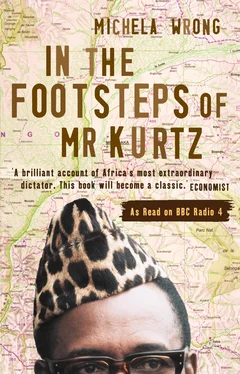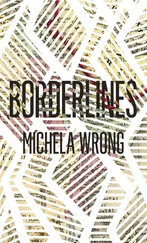Leopold had found his colony. Privately he raved about the potential of ‘this magnificent African cake’. But he was careful to present the situation in less enthusiastic terms to other European powers, wary of signs of expansionism by the Belgian newcomer. The flag flown at the newly established Congo stations ostensibly belonged to the International African Association, a philanthropic organisation Leopold had set up with the stated aim of wiping out the slave trade and spreading civilisation. Leopold encouraged missionaries to set out for the Congo and at the Berlin conference of 1884–5, at which the world powers carved up Africa, he triggered unanimous applause by proposing the Congo as a free trade zone, open to all merchants. His ambitions for the nation, he said, were purely philanthropic. In return, the Congo Free State was recognised as coming under his personal – as opposed to Belgium’s – control.
But, as Marchal’s work makes clear, the situation on the ground was to prove rather less high-minded. Clearing the jungle to build roads, stations and – eventually – a railway linking the hinterland with the sea, Stanley’s ruthless treatment of his native labourers won him the sobriquet ‘Bula Matari’ (Breaker of Rocks).
Unable to read the treaties they had signed, local chiefs discovered they had handed over both their land and a monopoly on trade. King Leopold, noted Stanley, in words that could have been used of Mobutu a century later, had the ‘enormous voracity to swallow a million of square miles with a gullet that will not take in a herring’.
If the signatures were given ‘freely’, Stanley left the clan leaders in no doubt that he had the force with which to pursue his interests. He took great delight in demonstrating the wonders of the Krupp canon, the latest in modern weaponry. ‘Notwithstanding their professions of incredulity as to its power,’ he recounted with satisfaction, ‘it was observed that the chiefs took great care to keep at a respectful distance from the Krupp, and when finally the artillerist, after sighting the piece to 2,000 yards, fired it, and the cannon spasmodically recoiled, their bodies also instantaneously developed a convulsive moment, after which they sat stupidly gazing at one another.’
Later on, the Force Publique, a 15,000–19,000-strong army of West African and Congolese mercenaries, was established to ensure Leopold’s word became law. Weapons and ammunition poured into the region. Just as Mobutu was later to give the nod to a system of organised looting by instructing his soldiers to ‘live off the land’, Leopold expected the Force Publique to provide for itself, pillaging surrounding villages in search of food.
Far from being a free trade zone, the colony’s very raison d’être was to make money for the King. Anxious to attract the foreign capital needed to build railways and bridges, Leopold divided part of the country into concessions held by companies in which he held a 50 per cent stake, with exclusive rights over tracts of forest, ivory, palm oil and mineral wealth. The rest of the country was defined as Crown property, where state agents enjoyed a business monopoly. Independent merchants who ventured into the area in search of ivory found their way physically blocked by Leopold’s officials. When the Arab traders operating in the north and eastern reaches of Congo were eventually driven out after a vicious war against the Force Publique, it was not – whatever the Tervuren museum may claim – because of any outrage over their slaving activities, it was because they threatened Leopold’s commercial interests.
By then, as the boom in the motor industry escalated Western demand for rubber, Leopold’s agents were knowingly mimicking the techniques of the Arab traders that Stanley had decried. Villagers, who had to tap the wild vines growing in the forest for gum, were set cripplingly high production quotas. If they failed to meet the targets, the Force Publique would descend on a village, burn its huts, kill at random and take womenfolk, children or chiefs prisoner until the villagers came to heel. Hostages were used as porters or sold as slaves to rival tribes in exchange for rubber or ivory, and thousands of orphaned children were marched off to Catholic missions to be trained as soldiers for the Force Publique.
Driving the state agents on was a cynical commission system that could double their miserly salaries depending on output and a sliding scale of payment which ensured that those who paid the villagers least for their deliveries of ivory or rubber were rewarded most highly. The lack of compassion seems a little more understandable when one considers the risks inherent in working in the Congo Free State. A staggering one in three state officials desperate enough to try their luck in Africa did not survive their postings, felled by malaria, typhoid or sleeping sickness. With the likelihood of dying in service so high, these young men were none too fastidious about the methods used to ensure output targets were met.
Looking at the mournful black and white photographs taken by appalled missionaries, it is sobering to register that around a century before the amputations carried out by Sierra Leone’s rebel forces sent shudders through the West – reinforcing stereotypes of African barbarism – a white-led, European-commanded force had already perfected the art of human mutilation. Soldiers in the Congo were told to account for every cartridge fired, so they hacked off and smoked the hands, feet and private parts of their victims. Body parts were presented to commanders in baskets as proof the soldiers had done their work well. Hence the photographs that, disseminated by the pioneering British journalist Edmund Morel, a precursor of campaigning human rights organisations such as Amnesty International, eventually shocked the outside world into action.
The chicotte, the gallows, mass executions were all liberally applied in a campaign that often seemed to have extermination of races deemed inferior as an incidental aim. The brutality inevitably triggered uprisings. The ferocity of those revolts was glossed over by colonial officers and subsequently downplayed by academics. But Congolese historian Isidore Ndaywel e Nziem records the words of a Captain Vangele, who was attacked four times by canoes manned by tribesmen from Mobutu’s own equatorial region, as proof the Congolese were no walkover: ‘It was the fiercest battle I have ever experienced in Africa … During that fight that lasted nearly three hours, the Yakoma did not cry out once, there was something terrifying about their silence, their cold determination.’
The Force Publique put down the resistance with ruthless effectiveness. Then, as today, no reliable census data existed in the Congo. But as the Force Publique stole children, destroyed families and spread hitherto unfamiliar diseases in its wake, missionaries began to notice an alarming incidence of depopulation taking place. Marchal hesitates to quantify the phenomenon, but Belgian officials were eventually to estimate that the country’s population had been halved since the founding of the Congo Free State, implying that 10 million people either died or fled the region. Professor Ndaywel puts the figure even higher, at 13 million.
Leopold had done his best to keep Congo’s contacts with the outside world to a minimum, trying to ensure a good press by discouraging visitors and systematically bribing politicians and journalists in Europe. But by the first years of the twentieth century, works such as Heart of Darkness were echoing what Roger Casement, a British diplomat, was to officially establish in a 1903 report commissioned by the European powers. Detailing cases of natives being forced to drink white men’s urine, having their bound hands beaten till they dropped off, being eaten by maggots while still alive and fed to cannibal tribes on death, Casement destroyed any remaining illusions. What had been laughably dubbed the Congo Free State was an exploitative system premised on forced labour, terror and repression.
Читать дальше












